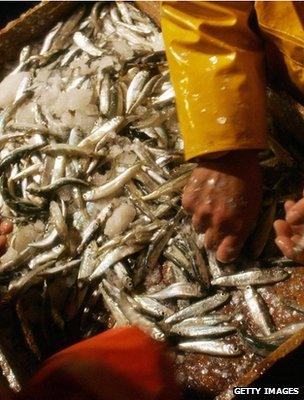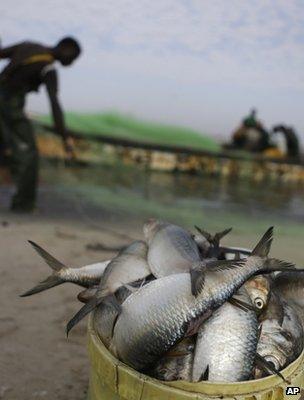Collective rights 'offer hope for global fisheries'
- Published

The legacy of ineffective management regimes pushed fish stocks to the brink of collapse
Collective community-based rights could put the world's fisheries on a sustainable footing after decades of over-exploitation, an expert suggests.
Previous management regimes had failed to protect both the industry and fish stocks' long-term future, explained Ragnar Arnason from Iceland University.
Communities would act like "shareholders", ensuring stocks were protected and not depleted, he added.
Prof Arnason outlined his views at the ICES science conference in Iceland, external.
"We have a severe problem of over-exploitation of global fish stocks, with the associated damage of marine ecosystems," he told BBC News ahead of his presentation.
"There is some indication that things may have stopped declining - at least in some parts of the world.
"However, we have essentially devastated the world's most valuable fish stocks but the good news is that we basically know how to solve the problem.
"That is by installing fisheries management regimes based on individual rights to fisheries or fishing communities so that operators, on behalf of the population, will find it in their own interests to treat the fisheries carefully and sustain or even rebuild them with long-term benefits to them and others."
Prof Arnason identified two main reasons for the world's fisheries to have been pushed to the point of collapse: improvements in the technology available to fishing fleets and the fast rise in the human population and its purchasing power.
"The result is that we are now going far and wide to harvest fish stocks," he explained.
Common tragedy
A driver of the downward spiral of fisheries around the globe was because they were considered to be the common property of large groups of people, he explained.

Marine scientists warn that many fisheries' days are numbered unless fish stocks are protected
"It is a fact that if there is something that is economically valuable and available to many people then there will be a race or competition to get as much of the valuable things as possible.
"This applies in every sphere of human life, not just fisheries. On land, we have seen this with forests, grazing land and freshwater resources.
"If you are only one of many and you cannot co-ordinate your actions with others then you are almost forced to overexploit, even if it is against your better knowledge.
"But if you do not go out and take what you can then others will and you will lose even more - this is the tragedy of the commons," said Prof Arnason, referring to the famous article by Garrett Hardin, published in Science magazine in December 1968, external.
The inefficiencies in the common property model of fisheries management regimes came to light in a 2008 UN and World Bank report, which calculated that the world's fishing fleet was operating at a US $50bn (£31bn) annual loss.
The authors said the loss was a result of depleted fish stocks and overcapacity in the fleet (too many vessels harvesting the available fish).
Individual responsibility
Prof Arnason, who addressed the annual science conference of the International Council for the Exploration of the Sea (ICES) in Reykjavik, said attempts to reform and improve fisheries were not anything new.

Many of the world's fisheries consist of small-scale low-tech fishing boats
"The only system that empirically has been found to function have been based on private property rights," he recalled.
"In fisheries, this is usually done by saying that an area of the ocean belongs to a group - this is called territorial rights. It works pretty well if you have sedentary species, such as shellfish.
"When you are dealing with fish stocks that are moving about then you usually have quantitative catch rights. So out of the total allowable catch for that particular stock, you would get a fixed [allocation], for example 1%.
"You then do not have to race or compete against your fellow fishermen. If this right is a long-term right, you also have a greater interest in the welfare of the fish stock and ecosystem because the amount you are allowed to catch increases as the state of the fish stocks/ecosystem improves.
"So you become a little bit like a shareholder in a company, you want the company to succeed."
Cutting costs
But he explained that these measures have to be enforced and monitored.
While, he argued, this was not prohibitively expensive in fleets of industrialised nations (about 3% of the value of the landed catch), it became problematic in many developing nations, where fisheries were made up from thousands of small-scale low-tech fishing vessels.
This gave rise to the idea of collective fishing rights to small communities, Prof Arnason said.
"These rights are for all the people in that community but the hope is that communities that are reasonably homogenous so they may be able to overcome the common property problem and install, enforce and maintain their own fisheries management system."
He added that fishermen, on the whole, were recognising the benefits of this shift in the management regimes but a potential hurdle remained.
"The problem they are facing is that before you get the gains, you have to rebuild the fish stocks," he told BBC News.
"You have to cut back on fishing and allow the fish stocks to rebuild. During this interval, there will be fewer catches and less profit - the benefits appear later.
"The global community - in the guise of the UN, World Bank etc - is keen to move the world in this direction, so I am optimistic and I think things are moving in the right direction."
- Published18 July 2013
- Published10 February 2012
- Published27 January 2012
- Published16 November 2012
- Published23 February 2012